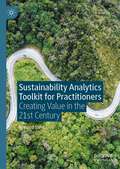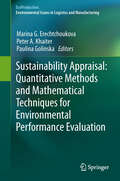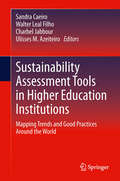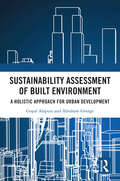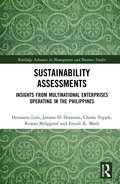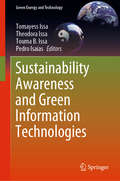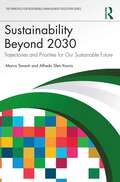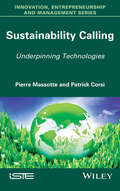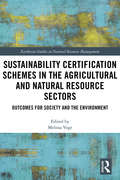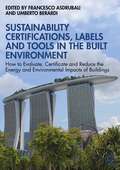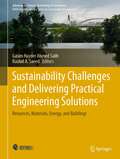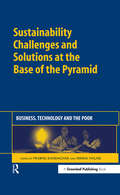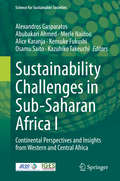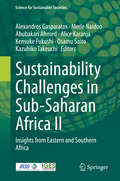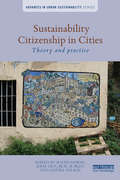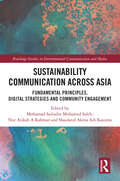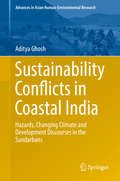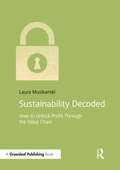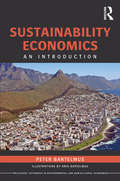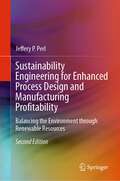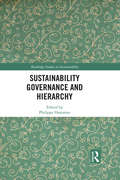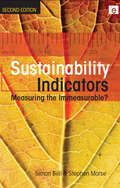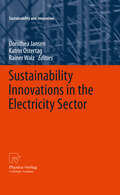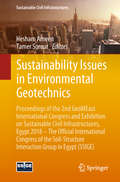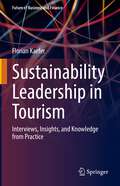- Table View
- List View
Sustainability Analytics Toolkit for Practitioners: Creating Value in the 21st Century
by Renard SiewThis book solicits meaningful contributions from key experts and practitioners that have been dealing with the emerging area of sustainability analytics. In doing so, readers would understand the cost, impact and performance of their sustainability initiatives. The book covers current analytical tools (eg: frameworks, standards, ESG indexes) to measure sustainability, and how these tools embed the Sustainable Development Goals (SDGs). In addition to that, a part of the book is also dedicated to the application of sustainability analytics, highlighting key challenges as well as the importance of engagement and communication in shaping the future direction of sustainability assessments. This book will be extremely useful to both researchers and practitioners who are looking for best--in-class practices to create value from their sustainability initiatives.
Sustainability Appraisal: Quantitative Methods and Mathematical Techniques for Environmental Performance Evaluation
by Paulina Golinska Marina G Erechtchoukova Peter A KhaiterOne of the most important issues in developing sustainable management strategies and incorporating ecodesigns in production, manufacturing and operations management is the assessment of the sustainability of business operations and organizations' overall environmental performance. The book presents the results of recent studies on sustainability assessment. It provides a solid reference for researchers in academia and industrial practitioners on the state-of-the-art in sustainability appraisal including the development and application of sustainability indices, quantitative methods, models and frameworks for the evaluation of current and future welfare outcomes, recommendations on data collection and processing for the evaluation of organizations' environmental performance, and eco-efficiency approaches leading to business process re-engineering.
Sustainability Assessment Tools in Higher Education Institutions
by Walter Leal Filho Sandra Caeiro Charbel Jabbour Ulisses M. AzeiteiroThis book contributes to debates on current sustainability practices, with a focus on assessment tools as applied in higher education institutions. These institutions are challenged to carry out management, research, and teaching, and to create settings that allow developing new competencies to address the complex global environmental, social, cultural, and economic pressures with which current and future generations are confronted. The first chapters discuss issues of sustainability in higher education, namely the role of universities in promoting sustainability and the emergent fields of sustainability science and education for sustainable development and how to integrate and motivate sustainability into the university. Subsequent chapters present examples of sustainability assessment tools specifically developed for higher education institutions, such as the AISHE - Auditing Instrument for Sustainability in Higher Education, the GASU - Graphical Assessment of Sustainability in Universities too, the STAUNCH - Sustainability tool for Auditing Universities Curricula in Higher Education. The use of other integrated tools are also presented. The papers have adopted a pragmatic approach, characterized by conceptual descriptions, including sustainability assessment and reorienting the curricula, on the one hand, and practical experiences on the other, with good practices from different edges of the world. Sustainability Assessment Tools in Higher Education Institutions will be of interest to graduate student, lecturers, researchers, and those setting university policy.
Sustainability Assessment of Built Environment: A Holistic Approach for Urban Development
by Gopal Alapure Abraham GeorgeThis book focuses on developing a holistic sustainability assessment model for built environment that can help in identifying sustainability issues and parameters for the built environment. It covers a wide range of sustainable built form issues in the local and regional contexts.The volume identifies significant built form sustainability indicators, criteria and sub-criterion while highlighting the importance of incorporating sustainability principles and assessment of sustainability. It also discusses the data collection process for defining priorities of sustainability parameters using the Analytic Hierarchy Process (AHP) technique. The book presents information to obtain fuzzy weights to classify assessed built form. The chapters in this book explain the development of an integrated built environment assessment system for infrastructure projects.This book will be of interest to students, teachers and researchers of planning, architecture, construction, urban studies, interior designing, urban planning and civil engineering. It will also be useful for architects, planners, civil engineers, interior designers, builders, developers, green building assessors and those interested in the sustainable assessment-built environment and urban development.
Sustainability Assessments: Insights from Multinational Enterprises Operating in the Philippines (Routledge Advances in Management and Business Studies)
by Jerome D. Donovan Cheree Topple Eryadi K. Masli Hermann Lion Rowan BedggoodThis book looks at how multinational enterprises address sustainability within their business activities. Contextualized within a rapidly developing country in Asia, it explores how management practices, tools and techniques are implemented by foreign multinational enterprises (MNEs) operating in the Philippines. The book introduces a useful three-stage and six-step sustainability assessment framework for company practices. The three stages are framed around impact identification, impact assessment and impact monitoring, with the six steps associated with these stages, including the initiation step, scoping, impact analysis, alternative selection, monitoring and evaluation, and feedback and follow-up. The book also highlights how voluntary guidelines and global sustainability platforms play an instrumental role in directing the practices of organisations when implementing corporate sustainability.
Sustainability Awareness and Green Information Technologies (Green Energy and Technology)
by Pedro Isaias Tomayess Issa Theodora Issa Touma B. IssaThis book addresses several aspects of environmental sustainability awareness and priorization, explores ways to use resources and processes more responsibly, and describes the strategies, models and tools required to overcome various challenges. Sustainable and green IT are used to minimize the current ICT recycling problems which are harming our planet. The book discusses the new green information technologies as alternatives to conventional ICT, which have significantly harmed nature, and examines how to make recent technologies such as cloud computing; social networking; smart technology; blockchains, IoT (internet-of-things); and big data sustainable. Exploring sustainability awareness and importance among individuals and organizations in the developed and developing countries, most of the contributions conclude that sustainability should be considered a duty in order to change mindsets, attitudes and actions so as to preserve our planet. Furthermore, it examines the green information technology strategies and models.
Sustainability Beyond 2030: Trajectories and Priorities for Our Sustainable Future (The Principles for Responsible Management Education Series)
by Marco Tavanti Alfredo Sfeir-YounisSustainability Beyond 2030: Trajectories and Priorities for Our Sustainable Future is an indispensable guide to understanding our planet's sustainability past, present, and future. It is a tool for enlightenment, engagement, and empowerment towards shaping a sustainable world as we approach the milestone year of 2030.Written by renowned sustainability experts, Marco Tavanti and Alfredo Sfeir-Younis, who was a pioneer in the field and participated in the first 1972 United Nations Conference on the Human Environment, this book offers an in-depth analysis of critical environmental issues, human development challenges, and the economic complexities of fostering equitable and sustainable growth. In addition to evaluating various pivotal policies and events, by extracting patterns and trajectories that have shaped our present commitments to the 2030 SDGs and the 2050 climate goals, Sustainability Beyond 2030 boldly projects into the future, identifying core priorities likely to guide the global agenda beyond our current commitments. This foresight is coupled with well-informed recommendations, essential for building resilience and fostering future opportunities.This book is a call to action for current and future generations of sustainability leaders. It encourages readers, whether policymakers, academics, or engaged citizens, to participate in the collective responsibility of crafting a sustainable world for future generations.
Sustainability Calling
by Patrick Corsi Pierre MasotteThis book discusses the key concepts of the technologies that underpin the drive towards sustainability in today's complex world. The authors propose an integrated view of the frontiers facing any organization nowadays - whether an enterprise, an administration or any human collective construction - that operates with a goal, a mission or an objective.
Sustainability Certification Schemes in the Agricultural and Natural Resource Sectors: Outcomes for Society and the Environment (Earthscan Studies in Natural Resource Management)
by Melissa VogtThis book provides a balanced critique of a range of international sustainability certification schemes across nine agricultural and natural resource industries. Certification schemes set standards through intramarket private and multi-stakeholder mechanisms, and while third-party verification is often compulsory, certification schemes are regulated voluntarily rather than legislatively. This volume examines the intricacies of certification schemes and the issues they seek to address and provides the context within which each scheme operates. While a distinction between sustainability certifications and extra-markets or intrabusiness codes of conducts is made, the book also demonstrates how both are often working towards similar sustainability objectives. Each chapter highlights a different sector, including animal welfare, biodiversity, biofuels, coffee, fisheries, flowers, forest management and mining, with the contributions offering interdisciplinary perspectives and utilising a wide range of methodologies. The realities, achievements and challenges faced by varying certification schemes are discussed, identifying common outcomes and findings and concluding with recommendations for future practice and research. The book is aimed at advanced students, researchers and professionals in agribusiness, natural resource economics, sustainability assessment and corporate social responsibility.
Sustainability Certifications, Labels and Tools in the Built Environment: How to Evaluate, Certificate and Reduce the Energy and Environmental Impacts of Buildings
by Umberto Berardi Francesco AsdrubaliThis book is aimed at covering all aspects of the evaluation, certification, and reduction of the energy and carbon footprint of the built environment from the scale of the city and its neighbourhoods, to the building level and finally to the level of single building materials and components. Many protocols, tools, and labels have been proposed in recent years, both at international and local levels, and the aim of the book is to classify, describe, and discuss all the different approaches and options.The chapters offer a comprehensive, up-to-date, and critical review of all the different certification methods that have been proposed at different levels in the building sector. The first chapter introduces the topic and its importance, providing data on the impact of the building sector and the construction industry. The following chapters are dedicated respectively to tools and protocols for cities and neighbourhood sustainability assessment, tools and protocols for buildings sustainability assessment and certification, and for building materials and components. Finally, this book includes an overview of the legislation and standards in the field and case studies to exemplify the application of the different tools and labels.This is a key reference for decision-makers, researchers, scholars, students, and professionals approaching research and work in the field of energy and environmental impact of the building sector be they engineers, architects, planners, owners, developers, or facility managers.
Sustainability Challenges and Delivering Practical Engineering Solutions: Resources, Materials, Energy, and Buildings (Advances in Science, Technology & Innovation)
by Gasim Hayder Ahmed Salih Rashid A. SaeedThis book highlights the recent findings and advances in science engineering technology and sustainability issues. It aims to discuss, reflect and share experience in addressing the findings in science engineering technology and sustainability. The book aims to report the various interrelated disciplines from different institutions to discuss, reflect and share technology and experience in addressing new findings and strategies. This book presents the proceedings of the Science Engineering Technology and Sustainability International Conference (SETS2021) which was held virtually—as sustainable virtual conferences become the new normal—during December 23–25, 2021. This book is presenting latest research findings, and it is suitable for researchers, postgraduate students, professionals and experts. The book includes interesting and top research in fuzzy modeling and decision-making applications in computer science. Several chapters address trending research about bioremediation and phytoremediation. There are mainly three research findings that cover artificial intelligence, sustainability and new technologies.
Sustainability Challenges and Solutions at the Base of the Pyramid: Business, Technology and the Poor
by Minna Halme Prabhu KandacharAround the turn of the millennium it had become painfully evident that development aid, charity or "global business-as-usual" were not going to be the mechanisms to alleviate global poverty. Today, there is little dispute that poverty remains the most pressing global problem calling for innovative solutions. One recent strategy is the Base of the Pyramid (BoP) concept developed by Prahalad and Hart, which relies on entrepreneurial activity tapping into the previously ignored markets of the economically most disadvantaged. It is a process requiring innovations in several disciplines: technological, social and business.This book covers a number of areas. First, much of the current BoP discussion emphasises targeting products to the needs of the poor. But do we actually know what the real needs of the poor are? This book takes a bottom-up human-centred approach and examines examples that truly engage the poor in BoP product and service development. What types of needs assessment methodologies are indicated considering the cultural differences in BoP countries? Are the existing methodologies adequate? Do they need to be redefined and redeveloped? Second, the book considers how we can balance poverty alleviation and stimulate economic growth without stressing the ecosystem. Tragically, the poor are hardest hit by the adverse effects of environmental deterioration such as water shortages, climate change or the destruction of habitats. While the economic welfare of the poor is critical, the BoP approach must balance its inherent paradox of encouraging greater consumption while avoiding further pressures on environmental sustainability. The link between the BoP approach and sustainable development is a key feature of this book. Third, it looks at innovation and asks what kinds of"bottom-up" innovation (open source, technological, social and business) support BoP initiatives (and sustainable development)?Fourth, the book deals with the relationship between development assistance and BoP. Is a BoP strategy the antithesis to development aid or can these two co-exist or even complement each other?Finally, the book raises questions about the relationship between corporate responsibility and BoP. Is BoP a new form of corporate neo-colonialism or a new form of corporate responsibility? Although the BoP concept has unleashed an extensive and generally enthusiastic response from academics, businesses, NGOs and governments, the knowledge domain around this concept is still in the early stages of development. This book addresses that need with a focus on the needs of the end-users – the poor – as a starting point for BoP products and innovations. With contributions from both supporters and critics, it provides a treasure trove of global knowledge on how the concept has developed, what its successes and failures have been and what promise it holds as a long-term strategy for alleviating poverty and tackling global sustainability.
Sustainability Challenges in Sub-Saharan Africa I: Continental Perspectives and Insights from Western and Central Africa (Science for Sustainable Societies)
by Alexandros Gasparatos Kensuke Fukushi Osamu Saito Kazuhiko Takeuchi Abubakari Ahmed Merle Naidoo Alice KaranjaThe aim of this 2-volume book is to highlight how Sustainability Science approaches can help solve some of the pervasive challenges that Africa faces. The volumes collect a number of local case studies throughout Africa that adopt transdisciplinary and problem-oriented research approaches using methodologies from the natural and the social sciences. These are put into perspective with chapters that introduce key sustainability challenges such using a regional focus. Through this multi-scale and inter/transdisciplinary approach the proposed volume will provide an authoritative source that will pack in a single volume a large amount of information on how Sustainability Science approaches sustainability challenges in African contexts. While there have been general books about sustainability science, none has had a strong African focus. As a result the 2-volume set fills a major gap in the Sustainability Science scholarship. This volume sets the stage for the series. Part I introduces key sustainability challenges in Africa. Parts II‐III highlights specific case studies related to these challenges from West and Central Africa.
Sustainability Challenges in Sub-Saharan Africa II: Insights from Eastern and Southern Africa (Science for Sustainable Societies)
by Alexandros Gasparatos Kensuke Fukushi Osamu Saito Kazuhiko Takeuchi Abubakari Ahmed Merle Naidoo Alice KaranjaThe aim of this two-volume book series is to highlight some of the most pervasive sustainability challenges that Sub-Saharan Africa faces. The two volumes contain 20 chapters that illustrate very diverse sustainability challenges throughout the continent, adopting interdisciplinary and problem-oriented research approaches, and methods from the natural and the social sciences. The very diverse case study chapters are put into perspective with chapters that introduce key sustainability challenges using a regional focus. Through this multi-scale and interdisciplinary approach the two volumes provide an authoritative source about the major sustainability challenges in the continent, and how to mobilise such perspectives to develop appropriate solutions. The two volumes have a uniquely broad focus that fills a major gap in the emerging Sustainability Science scholarship. Parts I-II highlight specific case studies on major sustainability challenges from Eastern and Southern Africa. Part III synthesizes the main lessons learnt from the chapters in the two edited volumes.
Sustainability Citizenship in Cities: Theory and practice (Advances in Urban Sustainability)
by Ralph Horne Anitra Nelson John Fien Beau B. BezaUrban sustainability citizenship situates citizens as social change agents with an ethical and self-interested stake in living sustainably with the rest of Earth. Such citizens not only engage in sustainable household practices but respect the importance of awareness raising, discussion and debates on sustainability policies for the common good and maintenance of Earth’s ecosystems. Sustainability Citizenship in Cities seeks to explain how sustainability citizenship can manifest in urban built environments as both responsibilities and rights. Contributors elaborate on the concept of urban sustainability citizenship as a participatory work-in-progress with the aim of setting its practice firmly on the agenda. This collection will prompt practitioners and researchers to rethink contemporary mobilisations of urban citizens challenged by various environmental crises, such as climate change, in various socio-economic settings. This book is a valuable resource for students, academics and professionals working in various disciplines and across a range of interdisciplinary fields, such as: urban environment and planning, citizenship as practice, environmental sociology, contemporary politics and governance, environmental philosophy, media and communications, and human geography.
Sustainability Communication across Asia: Fundamental Principles, Digital Strategies and Community Engagement (Routledge Studies in Environmental Communication and Media)
by Mohamad Saifudin Mohamad Saleh, Nur Atikah A Rahman and Shaidatul Akma Adi KasumaSustainability Communication across Asia distils the core components of environmental communication in the diverse milieu of Asian nations such as Indonesia, Malaysia, the Philippines, Thailand, and China. The chapters in this book engage readers in a clear-sighted view of issues, challenges, and strategies related to sustainability communication in Asia, examining fundamental principles, digital strategies, and the role of language, as well as community engagement. The first part of the book features underpinning ideologies of sustainability communication. The authors go on to explore the prevalent trends and approaches in sustainable communication in the digital realm, examining the internet in general, social media, and gaming platforms. Finally, the book discusses the green efforts adopted among selected Asian communities, the role of communication, and the resulting societal impacts. Readers will be introduced to many related examples of Asian sustainability cases and issues that may differ from Western experiences. Interesting topics such as environmental gamification, edutainment and sustainability communication, and social media and sustainability are among those presented and elaborated at length by 21 writers with industrial and academic backgrounds. Practical and inspiring, this book will be of great interest to students and scholars of sustainability and environmental communication, and Asian studies in general.
Sustainability Conflicts in Coastal India
by Aditya GhoshThis multidisciplinary work analyses challenges to sustainable development amidst rapidly changing climate in the world's largest delta - the Sundarbans. Empirical evidence unpacks grounded vulnerabilities and reveals their temporal socio-economic impacts. A novel concept of 'everyday disasters' is proposed - supported by data and photographic evidence - that contests institutional disaster definition. Then it uncovers how the geopolitics of ecological governance and its hegemonic discourse dominate local policies, which in turn fail to address local socio-ecological concerns, adaptation needs and development aspirations. Absence of local vocabularies, cognitive values and socio-cultural contexts along with spatially constricted, exclusionary, top-down techno-science approaches further escalate knowledge-action gaps. Deconstruction of multiscalar conflicts between the global rhetoric and transformative postcolonial geographies offers an ethical, Southern perspective of sustainability.
Sustainability Decoded: How to Unlock Profit Through the Value Chain (DoShorts)
by Laura MusikanskiThe value chain is the tried and true foundation of any profitable business.Sustainability Decoded is a no-nonsense business book that shows you how to increase profits by integrating sustainability into your company's value chain. This practical guide provides innovative tools and approaches for adding value at each station, including: Sustainability Matrix Decision Tool for Codes of Conduct; Triple Bottom Line Short Form; Eco-Label Graphic Matrix; Sustainability Ratio Guide; Life Cycle Analysis Grid; Local-Global Scorecard; the Redesign Card; the Green IT Checklist; the Balanced Scorecard for Life; the Biomimcry Backwards Forwards Tool.Sustainability Decoded provides a profitable means to practice sustainability. It is as useful to the non-business person who needs a quick guide to the practicalities and principles of adding value right across business processes as it is to the seasoned business professional looking for practical and profitable inspiration from sustainability. Includes case studies on Patagonia, and One PacificCoast Bank.
Sustainability Economics: An Introduction
by Peter BartelmusThe book is a concise introduction to an emerging field within economics. Drawing on numerous disciplines, including environmental science, environmental and ecological economics and optimal growth theory, sustainability remains a hazy and complex subject. The author set out with two objectives: one, to bring some order into the proliferating measures, models and management of sustainability; and two, to facilitate access to a complex inter-disciplinary subject area. The book points to practical ways of assessing and enhancing the long-term environmental and economic sustainability of our economies. The result is a fully international study that should bridge the gap between disciplines and prove to be an essential guide to anyone interested in one of the most important concepts in the social sciences.
Sustainability Engineering for Enhanced Process Design and Manufacturing Profitability: Balancing the Environment through Renewable Resources
by Jeffery P. PerlNow in an expanded and revised second edition, this book explores sustainability engineering through the lens of the manufacturing and chemical process industries to explain the safe and economical implementation of process designs to transform raw materials into valuable finished products. The author applies the principles of sustainability science to engineering methodology for residential, commercial, and industrial applications that support the perpetual availability of raw materials through recycling, reuse, and repurposing to incorporate inexhaustible supplies and encompasses the management and conservation of these resources in a manner that minimizes negative environmental impacts. New sections include:Coverage of electric power opportunities and challenges (solar, wind, and cogeneration),Efficiency improvement as an energy supply extender, Recycling as a material extender. The book examines relevant energy policies driving and affecting commercial, industrial, and residential energy utilization and includes new industrial case studies. Anyone involved in the design or manufacture of chemicals or the upgrade of existing manufacturing processes will benefit from this book’s suggestions for identifying improvement options while adding the pivotal aspect of sustainability to the usual cost and safety equation optimization elements.
Sustainability Governance and Hierarchy (Routledge Studies in Sustainability)
by Philippe HammanSustainability Governance and Hierarchy provides a solid, theoretically and empirically grounded reflection on the concept of "sustainability governance". This idea has been growing in popularity in social science literature, as well as among decision-makers and governance actors, as it brings together two vast fields of study that have sometimes been dismissed as vague or ideologically loaded. In order to link the concepts of "sustainability" and "governance", the book is organized around the exploration of hierarchy issues, which often lie in the background of the existing literature but are not the focus of analysis. The chapters reflect ongoing controversies and dialogue between scientists with different theoretical and thematic backgrounds, who are all willing to participate in and contribute to a constructive effort to reach a more inclusive and more theoretically relevant stage for sustainability studies, being content with merely global analyses. The book is an innovative contribution to the hierarchy/non-hierarchy debate regarding governance arrangements in the field of sustainability and sustainability studies. This book will be of interest to advanced students and scholars focusing on governance issues, sustainability studies, environmental studies, as well as on the methodological aspects of the social sciences (economy, geography, law, philosophy, political science, sociology, urbanism and planning).
Sustainability Indicators: Measuring the Immeasurable?
by Stephen Morse Simon BellPraise for the first edition: 'This book should be of interest to anyone interested in sustainable development, and especially sustainability indicators. Bell and Morse easily succeed in exposing the fundamental paradoxes of these concepts and, more importantly, they offer us a way forward. Readers ... will find their practical recommendations for those attempting to do sustainability analysis in the field most welcome, which is also the book's greatest strength.' Local Environment: The International Journal of Justice and Sustainability 'This book makes a valuable contribution to the theory and practice of using indicators for sustainability. It introduces systems ideas and a range of tools and techniques that have the potential to broaden and deepen our understanding of a whole range of complex situations. Well worth a closer look.' Christine Blackmore, Open University 'This is a book that explores new ways of thinking about how to measure sustainability... It offers stimulating food for thought for environmental educators and researchers.' Environmental Education Research 'This book tells me, as an SI 'practitioner', where I have been and why, and more importantly how I should be thinking in order to effectively present to and empower the local community in the years ahead.' David Ellis, Principal Pollution Monitoring Officer, Norwich City Council 'A practical guide to the development of sustainability indicators which offers a systemic and participative way to use them at local scale. Our preliminary results are highly positive and the approach is applicable in many contexts.' Elisabeth Coudert, Programme Officer Prospective and Regional Development, Blue Plan The groundbreaking first edition of Sustainability Indicators reviewed the development and value of sustainability indicators and discussed the advantage of taking a holistic and qualitative approach rather than focusing on strictly quantitative measures. In the new edition the authors bring the literature up to date and show that the basic requirement for a systemic approach is now well grounded in the evidence. They examine the origins and development of Systemic Sustainability Analysis (SSA) as a theoretical approach to sustainability which has been developed in practice in a number of countries on an array of projects since the first edition. They look at how SSA has evolved into the practical approaches of Systemic Prospective Sustainability Analysis (SPSA) and IMAGINE, and, in particular, how a wide range of participatory methodologies have been adopted over the years. They also provide an assessment of the strengths and weaknesses of projects that undertake work in the general field of sustainable development.
Sustainability Innovations in the Electricity Sector
by Dorothea Jansen Katrin Ostertag Rainer WalzThe future of modern societies depends on their ability to deal with the challenge of climate change in the coming decades. One essential component is a better understanding of innovation processes in the energy sector. This book focuses on sustainability innovations in renewable energies, combined heat and power, and energy service contracting, and analyses the institutions, actors and functions within the innovation system. Of particular interest is the question of whether the joint effect of EU-driven market liberalization and climate policies will succeed in establishing market forces that will drive actors towards more climate-friendly energy production. A special focus is on the role of local utilities in the electricity sector as opposed to large transmission net operators or regional net operators. The countries covered in the contributions include Germany, Denmark, the UK, Switzerland, and the Netherlands.
Sustainability Issues in Environmental Geotechnics: Proceedings of the 2nd GeoMEast International Congress and Exhibition on Sustainable Civil Infrastructures, Egypt 2018 – The Official International Congress of the Soil-Structure Interaction Group in Egypt (SSIGE) (Sustainable Civil Infrastructures)
by Hesham Ameen Tamer SorourThis edited volume deals with the attempts made by the scientists and practitioners to address contemporary issues in geoenvironmental engineering such as characterization of dredged sediments, geomaterials and waste, valorization of waste, sustainability in waste management and some other geoenvironmental issues that are becoming quite relevant in today's world especially in view of the high urbanization rates, advancement in technologies, and changes in consumption behavior of people. In this regard, wastes generated through the daily activities of individuals and organizations pose many challenges in their management. The volume is based on the best contributions to the 2nd GeoMEast International Congress and Exhibition on Sustainable Civil Infrastructures, Egypt 2018 – The official international congress of the Soil-Structure Interaction Group in Egypt (SSIGE).
Sustainability Leadership in Tourism: Interviews, Insights, and Knowledge from Practice (Future of Business and Finance)
by Florian KaeferThis professional guidebook highlights sustainable tourism development and management for businesses and destinations. It presents a unique collection of expert interviews, combined with latest insights and thoughts on the most relevant topics and trends linked to sustainability in tourism, sustainable business management, and destination development. This is a book which offers inspiring personal stories and reflections, and at the same time serves as essential know-how guide for busy tourism entrepreneurs, managers, and developers who care about business resilience and the well-being of destination communities.
